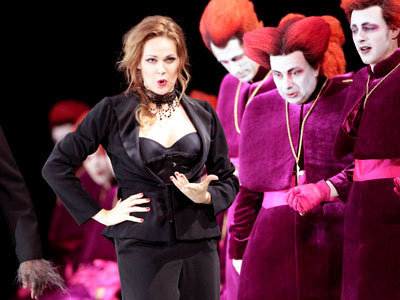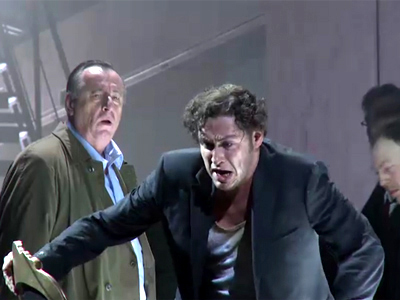
By ANDREW POWELL
Published: December 11, 2014
MUNICH — Puccini lost even before the curtain went up Nov. 15 on Hans Neuenfels’ conceptual new staging of Manon Lescaut for Bavarian State Opera. Anna Netrebko, its titular star, abandoned the project in quiet disgust, understandably it turned out. Disaster did not follow, but the night and the subsequent run will long be remembered for what might have been, musically.
The company broke the sorry news Nov. 3 after securing a substitute in Kristine Opolais. It cited “unterschiedlichen Auffassungen,” divergent opinions, between star and director and lamely lamented the stresses of theater life. It had not, apparently, considered managing those stresses so that no cast change was needed. In any case, the neat explanation rang hollow: Netrebko has a history of flexibility with Regietheater. She had signed on with a régisseur known for strange concepts and was no doubt looking forward to the highly visible introduction to Germany of a successful new role.
Sure enough, a more accurate picture emerged within days, in Der Spiegel and from the horse’s mouth. While the Russian soprano remained atypically mute, Neuenfels, 73, echoed the conversation in rehearsals that caused the rift. Netrebko had conveyed views about the choice facing Abbé Prévost’s 1731 material girl — between a life of passion with penniless des Grieux and one of wealth with Geronte — that he, Neuenfels, found “lächerlich und degradierend,” laughable and degrading, to women. He had reasoned back: “Möglicherweise findet man es in Russland als Frau gar nicht schlimm, sich von einem alten, reichen Mann aushalten zu lassen,” or, Maybe in Russia it is not considered at all bad for a woman to let herself be kept by an old rich man — this, not incidentally, to an actress whose own family endured deprivation and hunger at the start of her career. Bottom line: your views are no good, and probably because you are Russian. Bravo, Herr Direktor!
The cast change would not have mattered so much had Netrebko not triumphed in February in her role debut as Puccini’s Manon, and before an Italian audience under Riccardo Muti’s strict tutelage. But she had. Tapes demonstrate she was red hot for this role this year, with clear Italian, a dramatic command of the evolving character gleaned from years as Massenet’s protagonist, and, especially, rich tones to wield in all sorts of expressive ways.
Opolais has sung here often since her radiant first appearance in 2010 in a lyrically conducted (Tomáš Hanus), perversely staged (Martin Kušej) Rusalka, not always equaling that achievement. She is an enchanting presence on stage, an excellent musician, a game and cooperative colleague. The voice never makes an ugly sound, but it wanes in volume as it descends (there is no “chest voice” of substance), and her Italian wants stronger consonant projection.
On opening night Opolais (pictured) teamed magnetically with her des Grieux, Jonas Kaufmann. Both gave their best in Act IV, she singing to the boards for heft in Sola, perduta, he sailing high as a generous embodiment of Gallic desperation. Throughout Act II, alas, the soprano’s relatively monochromatic voice and missing gravitas limited the music: a little morbidezza helps in the singing of In quelle trine morbide, and Tu, tu, amore! Tu? at the start of the duet requires intensity and volume. Markus Eiche, as the immoral Lescaut, sounded glorious but strove in vain for italianità. Ditto for Sören Eckhoff’s loosely regimented choristers. Vivid supporting contributions came from Okka von der Damerau, a vocally lush Musico; Dean Power, a spright Edmondo; and the veterans Ulrich Reß, cast inexplicably as a hypertrichotic Maestro di ballo (hand is pictured, lower left), and Roland Bracht, a credible and clear Geronte.
The Bavarian State Orchestra showed astonishing sensitivity to Puccini’s freshest score, finely tracing its melodic ideas, scampering through the momentary ironies, deftly tinting the myriad and occasionally peculiar textures. It was an evening of great acumen and discernment for the brass, notably the trombone group, where an oversized cimbasso provided discreet assistance. Everything came across new and instant as propelled by Alain Altinoglu, Munich’s first master Puccinian in many seasons.
Neuenfels’ staging, which returns next July and will be streamed, advances the action to “Irgendwann,” whenever. It is black, framed in white neon. Its black-clad protagonists emote under seldom-varied white light. Stripped of time and place, the French cautionary tale is spun with the aid of projected texts auf Deutsch, plugging holes the director perceives in the Italian libretto and injecting wisdom and whimsy, little of it profound or funny. Early example: “‘When a coach comes, the opera begins,’ said Giacomo Puccini.” Neuenfels uses the choristers — Act I’s students, Act II’s guests, the gawkers at Le Havre — to toy around more invasively, mockingly, endowing them with flame-red hair to ensure we watch.
The action is closely calibrated to shifts in the score, but the rootless and sterile settings, combined with Neuenfels’ propensity to play with paraphernalia and gags of his own invention, send the opera down a path that is at odds with the brutal application of law and the personal destruction driving the music. Result: a diminished dramma mitigated somewhat by a powerfully bare Act IV.
It is intriguing to contemplate how much of this production would still have worked had its director been fired last month after offending Netrebko. Chances are, all of it. One imagines a late but efficient Bavarian State Opera team scramble to prepare for opening night without Neuenfels, mounting Manon Lescaut with the planned and more gifted soprano. In business, it would have been that way, and one wonders why a public theater is any different. Instead the company’s management allowed hurtful on-the-job remarks to deprive Munich, and the world, of what would certainly have been a momentous series of performances. Prima il regista, poi la musica.
Photo © Wilfried Hösl
Related posts:
Verdi’s Lady Netrebko
Blacher Channels Maupassant
Portraits For a Theater
Petrenko’s Sharper Boris
Mélisande as Hotel Clerk




Mélisande as Hotel Clerk
Monday, June 29th, 2015By ANDREW POWELL
Published: June 29, 2015
MUNICH — Noisy and sustained boos fell upon stage director Christiane Pohle and her team after Pelléas et Mélisande last night here in the Prinz-Regenten-Theater. Though not uncommon in this epoch of Regietheater, the intensity of the scorn for Bavarian State Opera’s new production was alarming coming from the dressy summer festival premiere crowd, many of whom were to adjourn to parties after the performance and whose circles deplore boorish behavior.
The fifteen scenes of Debussy’s 1902 drame lyrique to a Symbolist libretto by Maeterlinck unfold in Pohle’s conception in a hotel lobby, with Mélisande as a receptionist. Scene I, where Golaud nominally loses his way while hunting in a forest, has him seated drinking at the hotel’s bar. Scene XV, in which Mélisande will admit no guilt, takes place as a loose, group-therapy session.
The stationary lobby set, with hard, photo-realistic surfaces that look good on camera, is of a type costly to build and awkward to move, restricting scenic transformation in a way ordinary theatrical flats do not. After Golaud’s forest, Maeterlinck and Debussy call for une appartement dans un château, a setting devant le château, une fontaine dans le parc, une grotte, une des tours du château (from which Mélisande’s hair cascades down to Pelléas), les souterrains du château, une terrasse, and so on, a visual feast potentially.
BR Klassik carried the audio last night, preserving a musically imaginative performance. The Bavarian State Orchestra conveyed ravishing nuances as well as the burliness in Debussy’s score as led by Constantinos Carydis. Markus Eiche sang a lucid Golaud in properly projected French. Elena Tsallagova’s lovely tones proved ideal for Mélisande. As a mostly effective Pelléas, Elliot Madore followed bizarre stage directions: on his first date with Mélisande, for instance, he sat with his knees together while she stood. Okka von der Damerau inertly impersonated Geneviève. Peter Lobert as the Doctor outsang Alastair Miles’ Arkel, while Hanno Eilers, 12, of the Tölzer Knabenchor intoned Yniold bravely and drew the loudest applause.
Pelléas et Mélisande becomes the latest of numerous flops for the company’s impenitent Intendant Nikolaus Bachler, who insists on freedom for his stage directors — many of them grounded in straight theater and lacking flair for the visual and inter-disciplinary aspects of opera — without apparently recognizing his own duty to monitor quality during production development. Guillaume Tell (Antú Romero Nunes) and Věc Makropulos (Árpád Schilling) have been mounted here with jaw-dropping ineptitude over the last twelve months. Earlier stagings of Medea in Corinto (Hans Neuenfels) and Saint François d’Assise (Hermann Nitsch) went speedily to the dumpsters and to costume sale, the probable fate of this Debussy.
Photo © Wilfried Hösl
Related posts:
See-Through Lulu
Carydis Woos Bamberg
Horses for Mozartwoche
Mahler 10 from Nézet-Séguin
Time for Schwetzingen
Tags:Alastair Miles, Bavarian State Opera, Bavarian State Orchestra, Bayerische Staatsoper, Bayerisches Staatsorchester, Christiane Pohle, Commentary, Constantinos Carydis, Debussy, Elena Tsallagova, Elliot Madore, Hanno Eilers, Kritik, Markus Eiche, München, Münchner Opernfestspiele, Munich, Munich Opera Festival, Nikolaus Bachler, Okka von der Damerau, Pelléas et Mélisande, Peter Lobert, Prinz-Regenten-Theater, Review, Tölzer Knabenchor
Posted in Munich Times | Comments Closed